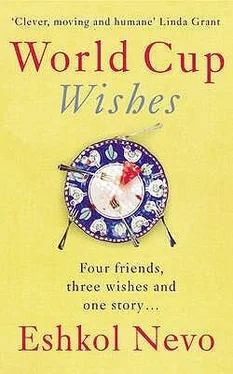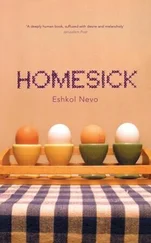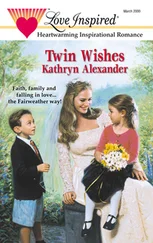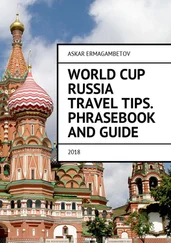They don’t care about anything, those cholerahs , I said, adding a Yiddish curse.
All they care about is money.
And crazy dancing.
And wild parties.
Oy, today’s youth.
They’re not yesterday’s youth.
Definitely not. So, Mr Zlotochinski, how’s your health?
OK. We’re going to the Dead Sea for the holidays.
For Rivkele’s psoriasis?
No, you have it mixed up. Rivkele has rheumatism. The psoriasis is mine. All mine.
*
Ofir has always been the ideal partner for imaginologues (that’s what he called our imaginary dialogues). In the army, we used to call each other when we were on night watch and really get into it: imaginologues between a worried mother and her DJ son, between the Chief of Staff and the Minister of Defence, between a Kit Kat and a Mars Bar.
In our last year in the army, when we were both a minute away from losing it completely, we took it one step further and wrote long letters between two characters we’d invented: Adva Auerbuch and Nurit Sadeh. I was Adva, a virgin from a kibbutz who was stationed at a base down on the Egyptian border where there were only guys. Ofir was the poetic Nurit, who grew up in a small town near Haifa and was stationed in General Headquarters in Tel Aviv, where she was exposed to all the less well-known aspects of the military big shots. She was desperately in love with her commander, Dan Rom, head of the Parade Branch, but he never even noticed her.
We wrote those letters for a whole year, devoting ourselves to the inner worlds of Adva and Nurit. Ofir’s letters were especially brilliant. He was able to eradicate his own identity and turn himself completely into Nurit. She had this kind of language that was hers alone, with expressions like ‘Threesomes are wearisome’, or ‘All the hearts are purple today’, or ‘The woman inside me is still a child’.
Later, when Ofir tried to get an ad agency job, he asked my permission to include parts of that correspondence in his work portfolio. I said yes, even though I thought it was a little weird.
*
You know who I was just thinking of? Ofir asked. We were still sitting on the bench.
Yes, I said, Nurit Sadeh.
How’d you know?
Because I was just thinking of Adva.
I wonder what finally happened to her.
Adva was killed in a terrorist attack. Not long ago.
A fitting end for her.
She and Shahar Cohen. Their pictures were printed next to each other in the papers.
And tell me, was she still a virgin when she …
Unfortunately, yes. They even mentioned it in the newspapers, in the caption under her picture: A quiet girl. She died a virgin.
And Nurit? What about Nurit Sadeh?
You’re asking me? You should know.
I know, Freed. I always knew. I wanted to see if you picked up on it.
On what?
Her commander, Dan Rom, he was in love with her too. But afraid to show it because he could have been charged with sexual harassment.
Tragic.
But in the end, she left the army.
And he confessed to her that …
Yes. But then she didn’t want him any more. Because what she actually loved was the endless yearning for him.
Because that way …
That way she could speak in that language of hers, which is a language of yearning, not of actually having.
So, in fact, the language was more important to her than love?
Exactly.
Very nice. You have the gift, Ofir. You should write. Really, why don’t you? After all, one of your World Cup wishes was …
The World Cup was before Maria.
Ofir said those words with finality. As if the fact that the World Cup came before Maria explained everything, and there was no room, not even a crack, for doubt.
I didn’t say anything, and took another swig of beer.
Besides, he said with a smile, it’s all your fault. If you’d been killed in the army like you promised, I would have made an Oscar-winning film about the four of us and then I wouldn’t have had to work in advertising at all, and everything would be different.
Before I could apologise and promise to try harder to die soon, an older woman with a green scarf around her neck came up to us. I thought she wanted to ask for money, but then she shook Ofir’s hand excitedly and thanked him, saying that she felt a lot better this week. I’m glad to hear it, he said, lightly massaging her palm. See you on Thursday? Thursday, Thursday, she repeated like an echo, and added, you’re the last person I expected to see here.
I wouldn’t expect to see myself here either, Ofir answered, and they both laughed heartily.
*
It’s all ego, Ofir said. A long minute had passed since the woman had gone, and I wasn’t sure what he was talking about. All the things I wished for then, at the World Cup, he explained. They were all ego. Why did I want to write a book? Not because I had something important to say, God forbid. I wanted to stand at a stall during Book Week and have thousands of people ask me to autograph their copy of my book. That’s what was in my mind when I made that wish.
What’s wrong with that?
It doesn’t lead to happiness. Just frustration. Because the ego is never satisfied, it’ll always demand more. And you live with the constant fear that one day, your inspiration will dry up. Or your audience will disappear. And I don’t want to be like that, always on the edge of the abyss. I mean, I can live that way, but I don’t want to.
So what do you want?
To live for someone else. To give. To be a father. To listen to my body. To heal. That woman who shook my hand before? Five years ago, she accidentally ran over her daughter in a car park. She backed up without noticing that the girl was standing there with her scooter. You know how much sadness there was in her back the first time I touched her? Whole lumps of sadness. In her shoulders. Between her shoulders. In her lower back. Do you see? What can you say to someone like that? Are there any words that can console her? Any words that can touch her? And writing … writing is just words … a collection of words … I might have believed in words once, but after all those years in advertising, with all the slogans I thought up … ‘Bid your wrinkles farewell’, ‘Natural, triple-action schnitzels’ — I realised that people use words mainly to lie. Either to themselves or to others.
I was silent. The more emphatically Ofir spoke, the more I suspected that he wasn’t absolutely sure of himself.
It’s not that I don’t have moments when … he went on. But still, you know me, my flat feet still hurt me sometimes … and sometimes ideas for stories pop into my head … and all the work on the NPO, for instance, came just in time for me, because the treatments … they don’t always … I don’t always really manage to be there, not like Maria … and recently, Maria, ever since Ilana … she isn’t like Maria … maybe that’s why it was convenient for me, all those meetings about the NPO … away from home, I mean.
Of course.
But running away is the easiest thing to do. That’s what my father did, that’s what I’ve done all my life. Jump to the next thing. So this time I’m trying to stay and tell myself that there’s no rush to get to anyone, to anything. Not that I have a choice. You know, because of the girl.
The girl?
It’s enough that one father left her. And she relies on me, you know? No one has ever relied on me like that before. My father never did because you can’t rely on a boy who was raised by his mother. And in the army, they didn’t rely on me because I was always the youngest guy in the unit. And at the agency, the minute they did rely on me — I fell apart. And here I can’t allow myself to fall apart. Because I can’t disappoint her. And that’s the most important thing to me. More important than anything else. More important than writing. Do you understand?
Читать дальше












